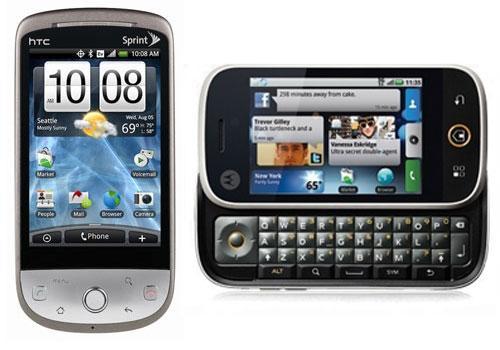
Sprint and, to a lesser extent, T-Mobile have fired the opening salvos in the battle for your mobile phone budgets this holiday season. This week alone, Sprint announced an industry first rate plan with unlimited mobile-to-mobile minutes across all carriers, and also an exclusive deal on Palm's second WebOS device, the Pixi. T-Mobile today launched MotoCliq, Motorola's first Android OS smartphone and the third in the carrier's portfolio. All of this is hot on the heels of Sprint's own announcement of their first Android device, the HTC Hero. All three phones, Pixi, Cliq and Hero, are slated to ship in time for the holidays.
Thursday at Mobilize '09, the mobile industry conference at which Motorola unveiled Cliq and hinted at a second Android device slated to launch in the coming weeks, the buzz was all about Moto's renewal and Sprint's suddenly bountiful smartphone portfolio. The "Now Network" currently has perhaps the most attractive high-end device lineup of any US carrier to go along with their long-attractive rate plans and, yes, still-sketchy reputation for mediocre customer service, network coverage and billing accuracy (deserved or not).
Think about it: Sprint now carries (or soon will) top-shelf Android, BlackBerry, WebOS and Windows Mobile devices in the Hero, Tour, Pre, and Touch Pro2, respectively. Add to that US exclusives on the only two WebOS phones currently in existence (Pre and Pixi), and a very intriguing feature phone coming down the pike in Samsung's Instinct HD, and you've got one heck of a lineup. We also may well see a Samsung Android phone launch on Sprint next month. Those devices are now further bolstered by Sprint's "Any Mobile, Anytime" plans, which bundle unlimited data and cross-carrier mobile-to-mobile calling into some very competitive rate plans.
Not to be outdone, T-Mobile has launched yet another Android phone in Motorola's Cliq, the first Moto Android phone and the third in the carrier's stable. Considering that AT&T and Verizon haven't even announced Android devices yet, T-Mo certainly has the upper hand in selling Google-based handsets to the U.S. market. While some - me included - scoffed at the recent myTouch 3G as being little more than yesterday's hardware repackaged with T-Mobile marketing, MotoCliq is a brand spanking new global exclusive, at least for now. That's not to say that it's the best Android device out there (I'll reserve judgement until I get some serious time with a review unit), but it's hard to argue with the appeal of "The New."
T-Mo isn't exactly lacking in the value category, either, with their myFaves plan. And they, too, have Touch Pro2 and a new BlackBerry (the budget-minded 8520) in their current lineup with the promise of one or two more high-end smartphones (BlackBerry Onyx, anyone?) to come before WInter.
This isn't to say that Sprint and T-Mo are about to knock AT&T and Verizon down from their lofty perches atop the US mobile carrier pile. But it does make me wonder just what the U.S.'s #1 and 2 carriers are up to. AT&T's got iPhone all to themselves, at least for a few more months, but look beyond Apple and the mighty BlackBerry Bold and HTC Fuze are starting to show their age. Expect AT&T to roll out one, if not two, brand new high-end Windows Mobile smartphones and maybe even a new BlackBerry before Thanksgiving time.
As for Verizon, they've got the BlackBerry Tour just like Sprint, and they just undercut both Sprint and T-Mo in launching the HTC Touch Pro2 at a $199 price point (both other carriers are asking $349). They've also got a solid messaging phone lineup in place with the LG enV Touch and enV3 and the brand new Samsung Rogue. But what about that new category, the "alternative smartphone"? Motorola said they'll be back with another new Android device within the next few weeks, and the rumor mill says it'll be Verizon-branded. For Big Red's sake, let's hope so - smartphones are going mainstream, and fast, and while I love the enV Touch and am digging Rogue so far, featurephones can't match the power of Android, WebOS, or iPhone OS.
We could well see iPhone migrating to Verizon, or even Sprint and/or T-Mo next year depending on what happens with negotiations between Apple and AT&T. But next year is too late for this year's back-to-school and holiday shopping seasons, which are basically upon us now. Sprint and T-Mobile have already shown that they're stepping up their games in hopes of a late 2009 surge out of the U.S. carrier basement. The coming weeks will tell what America's top two mobile networks have up their sleeves for your mobile wish lists this Fall and Winter.